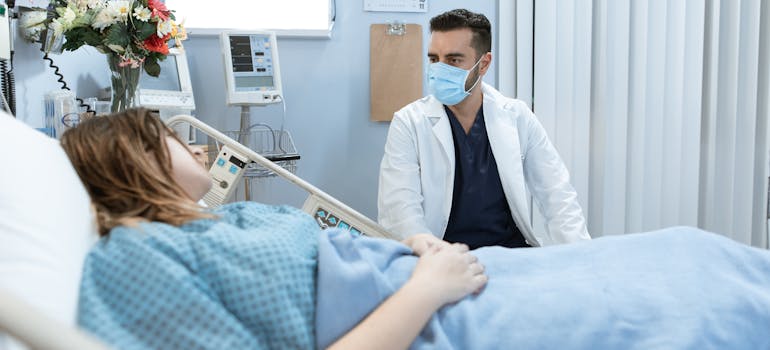Starting your journey to overcome addiction is a brave move. But where you choose to recover is just as important. Although it might seem simpler and more private, home rehab may not be safe. Without professional help, like the kind available at many rehabs in WV, you could face serious health dangers. We’ll show you why professional rehab centers are a safer and more effective choice. We’ll also explain the benefits of getting help from experts and how it can make your recovery smoother and more successful. Let’s discover why choosing professional care is the best way to ensure your safety and improve your chances of a full recovery.
Lack of Medical Supervision
When considering rehab at home, it’s important to understand the significant risks associated with the lack of medical supervision. Home rehab complications can arise without warning, and without professional oversight, these issues can escalate quickly, jeopardizing your safety and recovery. Professional guidance is critical not only for managing withdrawal symptoms but also for addressing unexpected medical issues that can occur during detox.

We want to emphasize the necessity of professional oversight to ensure a safe recovery process. By choosing a professional rehab facility, you gain access to medical experts who can promptly respond to any complications and adjust treatments as needed. Always remember, the risk of tackling rehab alone can lead to severe health consequences, making professional care an essential choice for your safety.
Potential for Complications
Attempting detox at home can expose you to significant risks due to the absence of a controlled medical environment. Now, let’s highlight the dangers of home detox and question the effectiveness of home rehab, emphasizing why professional settings are crucial for safety.
Complications during an unsupervised detox can include:
- Dehydration: Without medical supervision, maintaining proper hydration and electrolyte balance can be challenging.
- Seizures: Withdrawal from certain substances can lead to seizures, requiring immediate medical intervention.
- Life-threatening conditions: Severe withdrawal symptoms can escalate into critical health emergencies.
These complications underscore the risks of home detox and illustrate why professional oversight is essential. Is home rehab effective? Without the safeguards and expertise provided in a professional environment, the risks often outweigh the benefits.
Limited Access to Medications and Treatment
Home rehab often falls short due to limited access to necessary medications and therapies. This section addresses the barriers you might face in home settings and highlights why professional rehab is critical for effective treatment.

Challenges in accessing proper treatment at home include:
- Limited medication availability: Obtaining the right medications for detox and maintenance can be complex without a professional’s prescription.
- Lack of specialized therapies: Therapies that significantly aid recovery, such as cognitive-behavioral therapy or group sessions, are rarely available outside of professional settings.
- Risks of rehab without medical supervision: Without professional guidance, there’s a higher chance of complications and ineffective treatment.
These points illustrate why choosing a professional rehab facility matters. Such settings provide comprehensive care, ensuring you receive the right medications and therapies tailored to your recovery needs.
Why Professional Rehab Matters
Choosing professional rehab over a DIY approach is crucial for many reasons, particularly when considering the dangers of DIY rehab. In a professional setting, patients receive comprehensive care tailored to their specific needs, which significantly increases the chances of a successful recovery. Professional rehab facilities are equipped with medical and therapeutic experts who specialize in addiction treatment, offering both immediate medical interventions and long-term support.
These facilities provide a controlled environment where every aspect of the patient’s health can be monitored. This level of care is critical for safely managing withdrawal symptoms and preventing relapse. Additionally, professional rehabs offer access to various therapies and support groups, helping patients address not only their physical dependence but also the psychological factors contributing to their addiction. This holistic approach is nearly impossible to replicate at home and underscores the importance of professional care in overcoming addiction effectively and safely.
Risk of Relapse
Home rehab may not be safe due to its lack of structured support and professional guidance, factors that greatly increase the risk of relapse. In contrast, professional long term drug rehab WV centers are designed to support lasting recovery. These facilities provide continuous guidance and a supportive environment that are essential for maintaining sobriety.

Rehab centers teach valuable coping mechanisms and strategies to manage cravings and triggers, which are critical skills for long-term recovery. They also help individuals develop a comprehensive and sustainable recovery plan tailored to their specific needs. This structured approach ensures that each person has the best possible foundation for a life free from addiction, significantly reducing the likelihood of relapse compared to unsupported home rehab efforts.
Management of Co-occurring Conditions
Managing addiction alongside mental health disorders is complex. However, a reputable dual diagnosis treatment West Virginia program can provide you with expert care for both conditions at once, which is essential for effective recovery. Trying to handle these issues through home rehab may not be safe, as it lacks professional oversight and proper medical treatment.
Facilities specializing in dual diagnosis offer a safe environment where both mental health and addiction are treated together. This approach helps prevent the treatment of one condition from negatively affecting the other, reducing the risk of relapse. Such integrated care is crucial because it ensures that all underlying issues are addressed, making recovery more sustainable and successful.
Psychological Support and Counseling
Effective recovery from addiction involves more than just physical detox; it requires addressing the underlying psychological triggers that led to substance dependence. Counseling and psychological support play essential roles in this process, helping individuals understand and manage their behaviors and emotions.
Concerns about whether it is safe to detox at home often lead individuals to seek professional help, where they can receive the necessary psychological support in a controlled environment. This holistic approach is crucial in preventing relapse and promoting long-term recovery.
Therapeutic Support in Rehab
In rehab, therapeutic support is vital for addressing the complex mental health issues associated with addiction. Professionals in substance abuse treatment WV programs provide one-on-one counseling, group therapy, and other psychological services that help individuals uncover the root causes of their addiction.
This support is critical in teaching coping strategies and helping individuals build a new, healthier life. Such therapy sessions are tailored to each person, ensuring that treatment addresses specific needs and personal challenges, making the recovery process more effective.
Holistic Approaches to Recovery
Holistic approaches to recovery emphasize treating the whole person, not just the addiction. This comprehensive care integrates physical health, mental well-being, and emotional support through various therapies.
Activities that can serve as holistic therapy for addiction may include activities like yoga, meditation, art therapy, and nutritional counseling. These therapies work alongside more traditional treatments to improve overall health, enhance emotional resilience, and reduce stress. By focusing on all aspects of health, holistic recovery plans help individuals build a sustainable foundation for a drug-free life, reinforcing the idea that recovery is a multifaceted journey.

Safety Concerns for Loved Ones
Conducting rehab at home may not be safe and can expose family members and friends to significant emotional and physical risks. Choosing professional rehab is a safer alternative that protects not just the individual in recovery but also their loved ones. Here are key risks associated with home rehab:
- Increased stress on family dynamics
- Potential exposure to aggressive or harmful behaviors
- Emotional burden of managing a medical crisis without professional help
- Risk of enabling rather than supporting recovery
Professional rehab facilities provide a safe environment where trained staff handle the complexities of recovery. This ensures that safety protocols are followed, reducing the burden on loved ones and promoting a healthier, more supportive recovery process for everyone involved.
Legal and Ethical Considerations
Choosing to undergo rehab at home rather than in a professional facility carries significant legal and ethical risks that can seriously impact both the individual seeking treatment and their family. Legally, if the level of care at home fails to meet certain health standards, it could be seen as neglect, especially in severe cases where the health consequences could be life-threatening. Without professional monitoring, managing withdrawal symptoms and any complications that arise can be mishandled, leading to worsened health conditions or even critical situations.
Ethically, there’s a responsibility to provide adequate care that effectively addresses the complex needs of someone recovering from addiction. Home rehab often lacks the comprehensive approach needed to treat substance abuse disorders safely and effectively. This can result in an inadequate treatment that fails to address underlying issues or support long-term recovery, increasing the risk of relapse and further harm.
It’s crucial to understand why self-detox is dangerous; without professional supervision, you could miss critical health warnings or handle withdrawal improperly. Professional rehab centers ensure you receive comprehensive treatment and support, meeting all legal health and safety standards.
Access to Professional Rehab Services
Finding the right rehab center and managing the costs are crucial for a successful recovery. We want to simplify the process of choosing a rehab facility and emphasize why detoxing alone isn’t safe. We’ll discuss how to evaluate inpatient drug rehab centers in WV to find the best fit for your needs. Additionally, we’ll cover how to navigate financial options, to help make treatment more affordable.

Navigating Treatment Options
Choosing the right rehab facility is key to successful recovery. It’s important to know when to seek professional help for addiction withdrawal, as timely intervention can greatly improve outcomes. This section guides you through evaluating different drug rehab centers in WV, helping you understand the services each offers and how they might fit your specific needs.
Start by identifying centers that specialize in treating your type of addiction and check their credentials and success rates. Consider the types of therapy offered—some may provide more holistic approaches, while others focus on medical treatments. Location and cost are also significant factors. Most importantly, the facility should offer a supportive and safe environment, crucial for effective recovery. Taking these steps will help ensure you choose the best rehab center for your journey to wellness.
Financial and Resource Guidance
If you or your loved one are looking for a drug rehab that accepts Tricare, you’re in luck. Tricare often covers a range of treatments, making it easier for you to access the care you need without worrying too much about the costs. To make the most of your coverage, start by contacting Tricare directly or visiting their website to get detailed information about what your plan covers.
Besides insurance, look into additional resources like local community programs, grants, or sliding scale payment options that rehab centers might offer. These can help manage any costs not covered by Tricare, ensuring that financial barriers don’t stand in the way of your recovery journey. Remember, the goal is to get you the help you need without added financial stress.
Supporting Loved Ones in Seeking Help
Supporting a loved one through addiction recovery is crucial. It’s important to talk openly, showing understanding and offering encouragement. Stress the advantages of professional rehab—structured support, expert care, and a safe environment that home rehab lacks.

If your child is struggling, consider drug rehab programs for young adults. These programs are specifically designed to meet the unique needs of younger people, providing therapies and support that resonate with them. Benefits of these programs include:
- Age-specific therapies: Tailored to address the psychological and social challenges that young adults face.
- Peer support groups: Offering a chance to connect with others facing similar struggles, which can enhance motivation and empathy.
- Developmental focus: Helps young adults develop life skills and coping mechanisms that are crucial during this formative stage.
- Family involvement: Often includes family therapy sessions that improve communication and support systems at home.
Help your loved one by researching rehab options together, attending consultations, and providing constant encouragement. Your support can be pivotal in their decision to seek professional help, guiding them towards a healthier and more stable future.
Choose Safety, Choose Professional Care
Choosing to undergo rehabilitation at home may seem convenient, but it’s important to understand that home rehab may not be safe. Without medical supervision, access to proper treatments, and professional support, the risks significantly increase. This includes severe health complications, a higher chance of relapse, and overwhelming challenges for loved ones. You deserve a safe and structured path to recovery. Opt for professional rehab services that offer comprehensive support and proper care. Remember, your health and safety are paramount, and professional settings are equipped to provide the necessary tools for a successful recovery journey.



